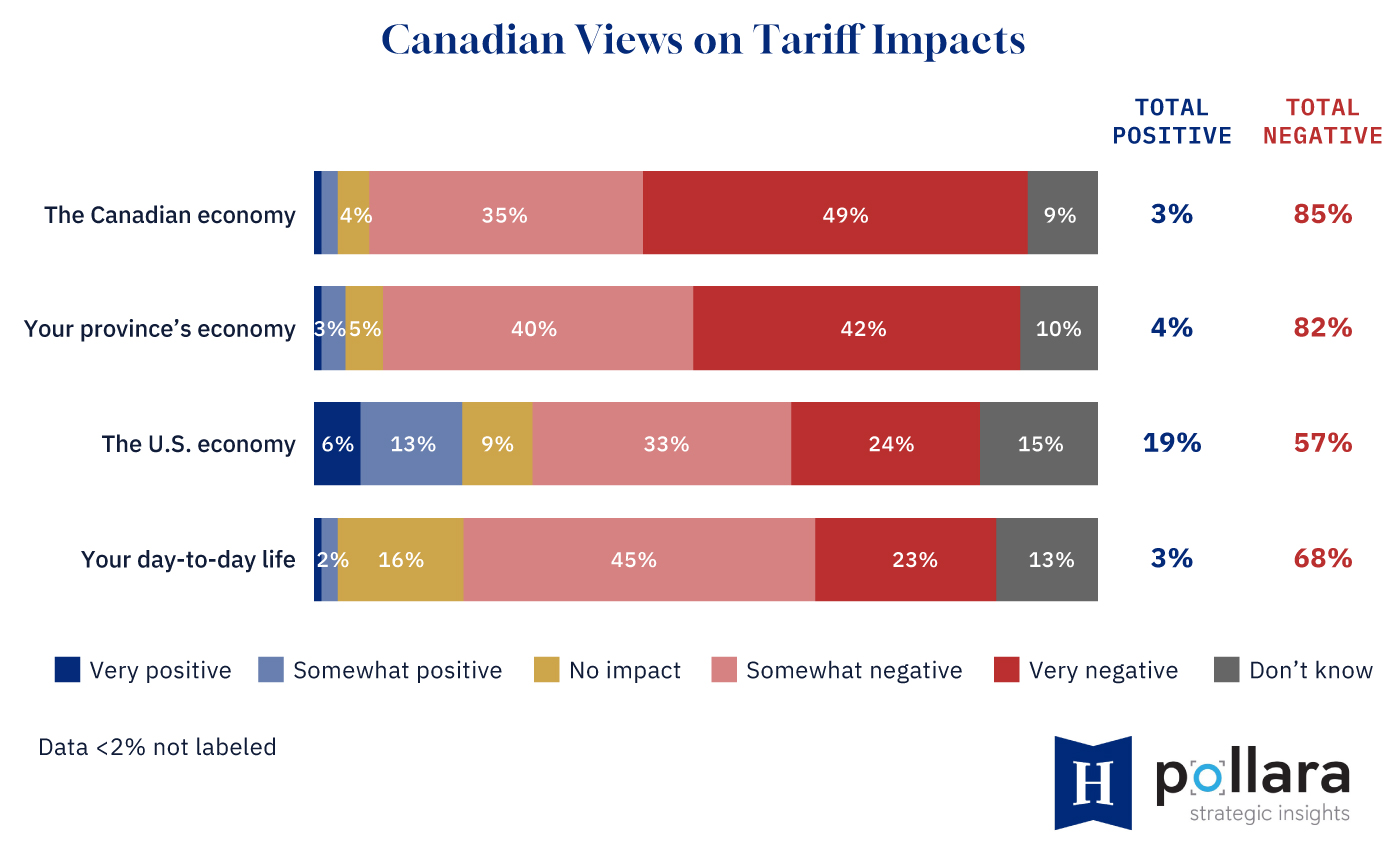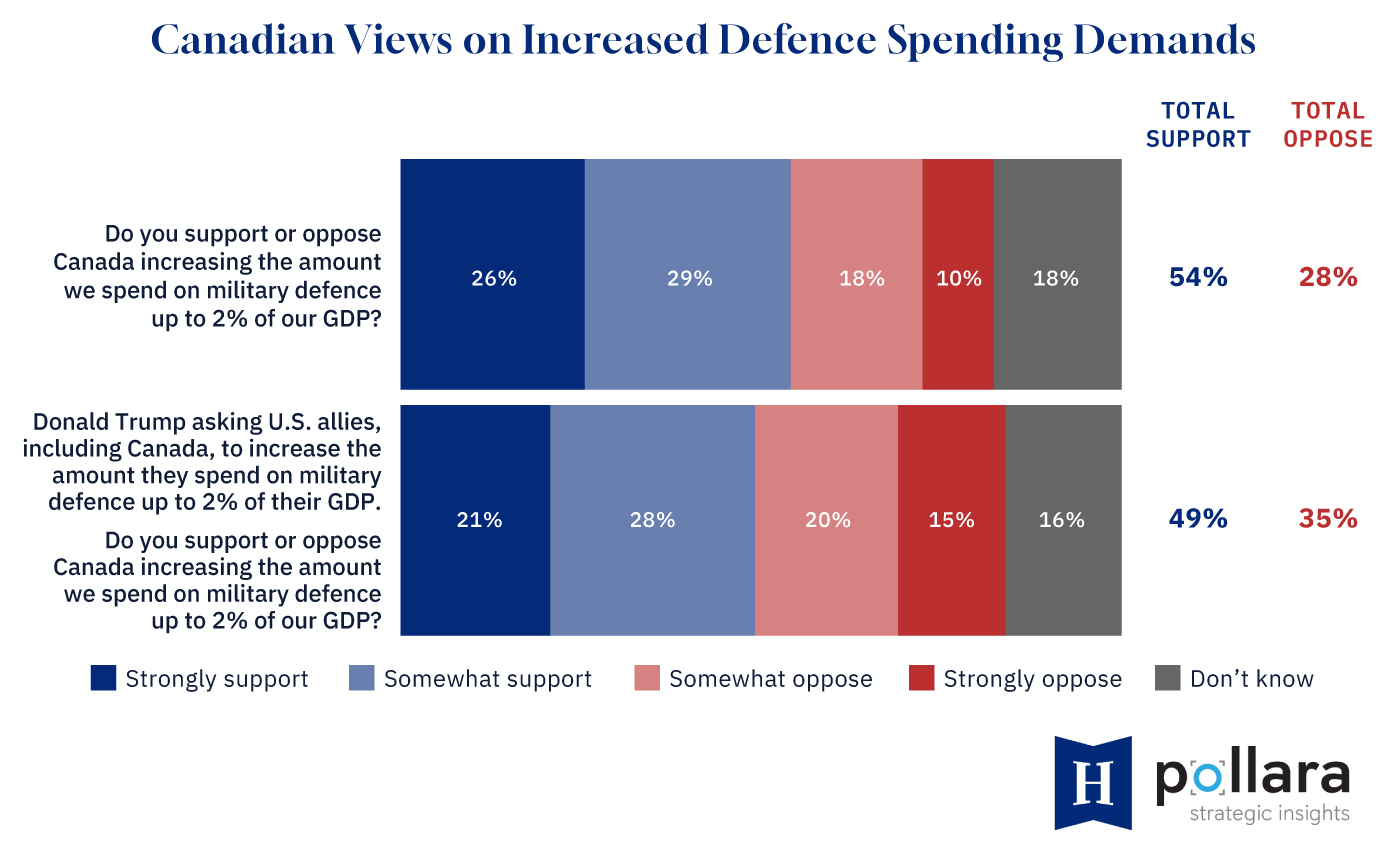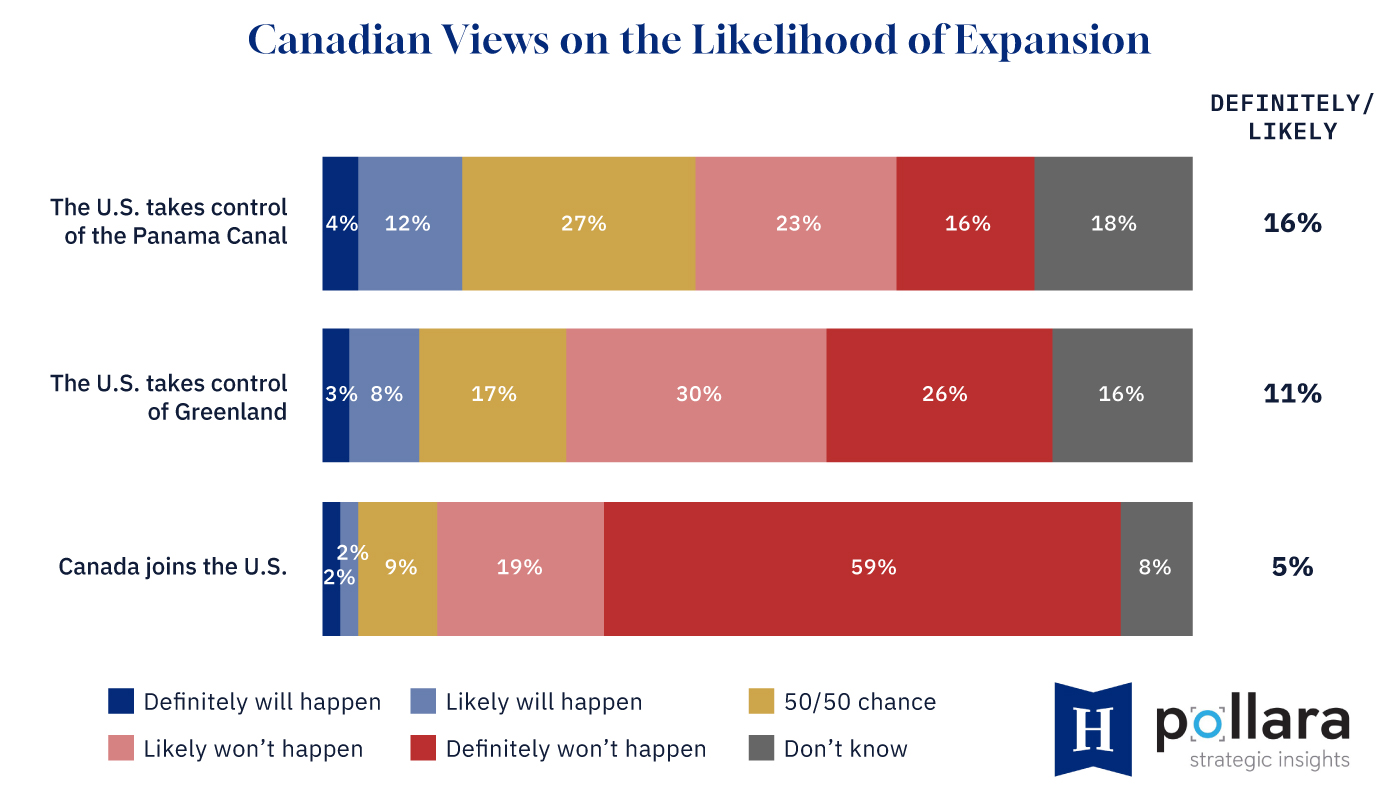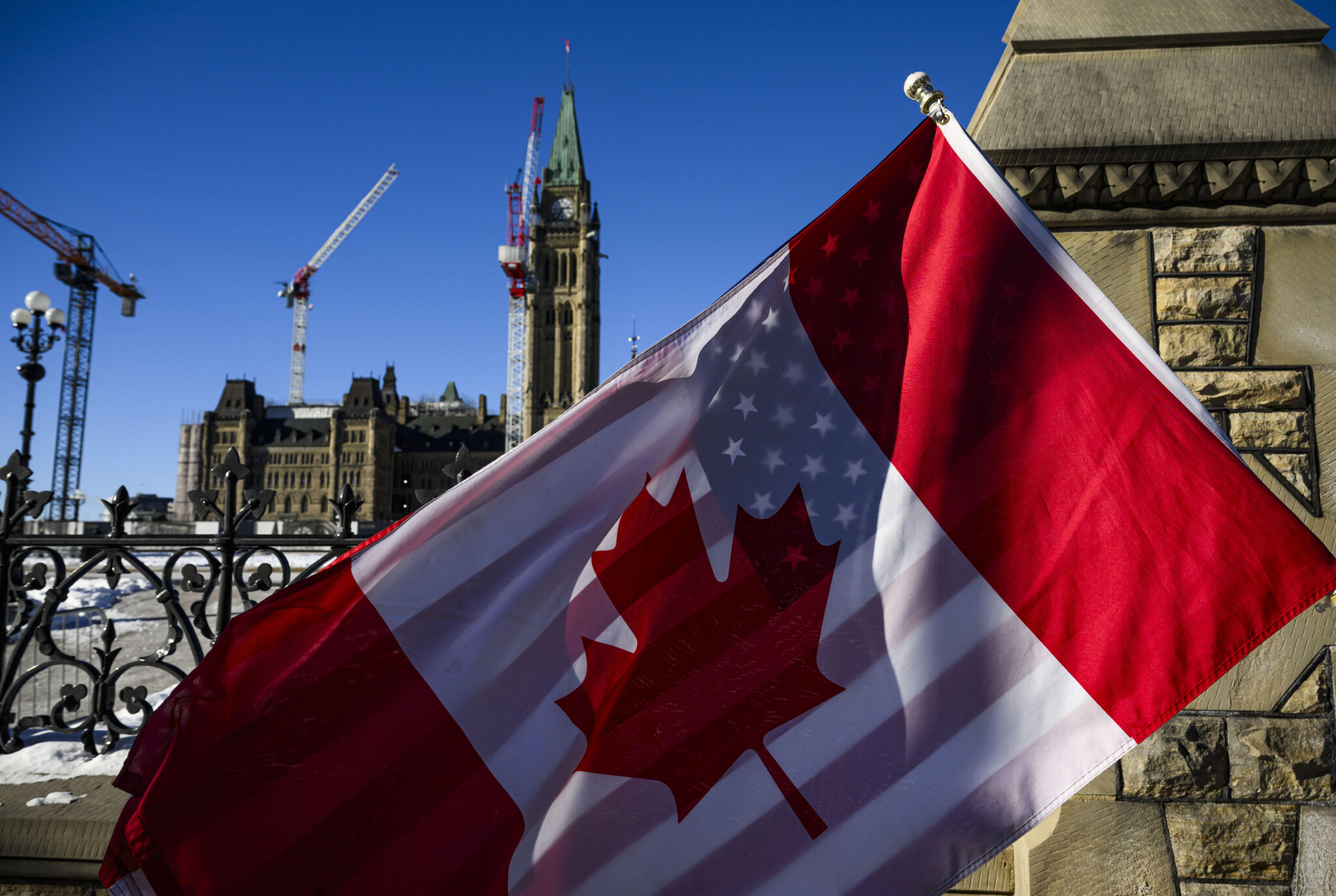In a 1961 address to the Canadian Parliament, President John F. Kennedy famously stated, “Geography has made us neighbours. History has made us friends. Economics has made us partners. And necessity has made us allies.” This compelling declaration has since served as a guiding principle in Canada-U.S. relations, highlighting the deep and complex ties between the two nations. From economic integration to military alliances, this partnership has endured numerous political shifts, trade disputes, and diplomatic negotiations.
However, as Canada enters 2025, this historically close relationship is facing significant challenges. The latest Trump Tracker report from Pollara Strategic Insights provides a comprehensive analysis of Canadian attitudes toward the challenges our two countries are facing. The report, based on an online survey conducted between January 20 and 27, 2025 with 1,504 Canadian adults, underscores growing concerns about economic policies, defence commitments, and diplomatic relations.
Issue divide
Beyond the heated rhetoric and emotional debates surrounding current Canada-U.S. relations, the key priority remains addressing substantive policy issues. For Canadians, the most pressing concern is the Trump administration’s potential imposition of a 25 percent tariff on Canadian goods. Our findings reveal widespread apprehension about the economic impact, with a nuanced disconnect between national and personal consequences. While 85 percent of Canadians believe the tariffs would harm the national economy, and a further 82 percent expect negative effects on their provincial economies, significantly fewer (68 percent) expect the tariffs to impact their personal finances and daily lives.

Graphic credit: Janice Nelson.
There are also concerns about the implications for the U.S. economy, as 57 percent of Canadians predict negative consequences for the American economy, while 19 percent believe the tariffs could benefit certain U.S. industries, recognizing Trump’s protectionist economic strategy. These findings highlight a growing unease about the future of cross-border trade, a cornerstone of Canada-U.S. relations since the North American Free Trade Agreement (NAFTA) and its successor, the United States-Mexico-Canada Agreement (USMCA).
Another area of contention is defence spending. Trump has repeatedly called on NATO allies, including Canada, to increase military spending to 2 percent of GDP. Canadian attitudes on this issue are mixed, with 54 percent of Canadians supporting increasing defence spending to meet NATO targets, and 28 percent opposing such an increase. However, support drops to 49 percent when this is framed as a direct request from Trump, while opposition rises to 35 percent. This shift suggests a reluctance among Canadians to be seen as capitulating to U.S. demands, even if they might otherwise support increased military expenditures.

Graphic credit: Janice Nelson.
Unneighbourly love?
The Trump Tracker also underscores a significant deterioration in Canada-U.S. relations at the public opinion level, driven largely by the unpopularity of Trump and his administration’s policies. More importantly, the sharp increase in negative sentiment toward Trump personally has spilled over into Canadians’ attitudes towards the U.S. more broadly. This implies that Trump’s rhetoric, trade policies, and approach to international relations are straining the historically close ties between the two countries.
One of the most widely recognized rhetorical salvoes from the U.S president is the repeated comments about making Canada the 51st state. An overwhelming 92 percent of Canadians have heard these remarks, and reactions are largely skeptical but varied. Only 10 percent believe Trump is joking, while 34 percent take him seriously, and 47 percent see the statement as a negotiation tactic.
Gender differences play a role in these perceptions, with women (40 percent) significantly more likely than men (28 percent) to believe Trump is serious about annexing Canada. Despite the widespread awareness of these comments, very few Canadians consider the possibility of U.S. territorial expansion to be realistic with only 5 percent thinking Canada might join the U.S.
It is worth noting that 11 percent believe the U.S. could take control of Greenland and 16 percent think he may take control of the Panama Canal. These results indicate that while Trump’s rhetoric generates strong reactions, most Canadians ultimately view it as political posturing rather than a credible threat.

Graphic credit: Janice Nelson.
It remains too early to determine the lasting impact of the ongoing tensions between Canada and the U.S. A key question is whether Canadians will distinguish their personal feelings about Trump from their broader views of Americans. So far, that distinction appears minimal. Trump’s unpopularity has grown, with 68 percent of Canadians now viewing him negatively—an increase of four percentage points since December 2024—while only 22 percent hold a positive opinion.
This sentiment has also contributed to a declining perception of the U.S. as a whole. Currently, 63 percent of Canadians view the U.S. unfavourably, a significant shift from six months ago when 53 percent held a positive opinion, and only 30 percent were negative. Now, just 30 percent of Canadians express a favourable view of their southern neighbour, reflecting a clear and accelerating downward trend.
Regional variations further highlight the complexity of Canadian views. Atlantic Canada, Quebec, and British Columbia exhibit the highest levels of negativity, reflecting their historically progressive political orientations. Ontario, Canada’s most populous province, follows the national trend, leaning negative but somewhat divided. Alberta, Saskatchewan, and Manitoba show relatively higher levels of positive sentiment toward both the U.S. and Trump, though a considerable degree of skepticism remains.
Notably, only 20 percent of Canadian seniors have a positive view of the U.S., while a striking 76 percent express a negative perception, suggesting a significant generational divide in attitudes toward Canada’s neighbour.
One voice?
The late Yale professor Charles Lindblom described policymaking as “the science of muddling through,” a phrase that aptly characterizes the current policy challenges facing Canada and the U.S. The February Pollara Trump Tracker highlights growing Canadian resistance to Trump’s policies and rhetoric, with key findings revealing a sharp decline in positive sentiment toward the U.S., widespread concern over the economic impact of tariffs, deep skepticism about Trump’s leadership and intentions toward Canada, and reluctance to comply with his demands for increased defence spending. While geography, history, and economic ties continue to bind Canada and the U.S., the relationship is entering a period of heightened uncertainty and tension.
So far, Canada’s response has emphasized the importance of presenting a united front. While this strategy appears both logical and defensible, the data suggests underlying trends that could make it difficult to sustain. Political affiliation remains a decisive factor in shaping opinions about Trump.
Liberal and NDP voters overwhelmingly disapprove of him, with 87 percent and 88 percent viewing him negatively, respectively. In contrast, Conservative voters are more divided, with 44 percent expressing a positive view and 47 percent a negative one. This indicates that while Trump is deeply unpopular among Left-leaning Canadians, he retains some support among some conservative voters.
Age is another key factor influencing opinions. Older Canadians are the most critical, with 82 percent of those aged 65 and older disapproving of Trump and only 12 percent viewing him positively. Among those aged 50 to 64, 70 percent disapprove, while just 20 percent approve. Younger Canadians, though still largely negative, are somewhat more lenient—60 percent of those aged 18 to 34 hold an unfavourable opinion, while 28 percent see Trump in a positive light. Those aged 35 to 49 show similar sentiments, with 61 percent disapproving and 25 percent approving.
These generational differences suggest that while Trump’s style of politics resonates slightly more with younger and conservative voters, he remains deeply unpopular among older Canadians, who may be more invested in preserving traditional Canada-U.S. relations.
Trump’s presidency is shaping Canadian public opinion in profound ways. Whether history will continue to reinforce that friendship or drive Canada and the U.S. further apart remains an open question.








